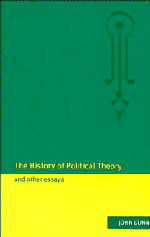Book contents
- Frontmatter
- Contents
- Preface
- Acknowledgements
- 1 Introduction
- 2 The History of Political Theory
- 3 Contractualism
- 4 Political obligation
- 5 Trust
- 6 The claim to freedom of conscience: freedom of speech, freedom of thought, freedom of worship?
- 7 Property justice and common good after socialism
- 8 The dilemma of humanitarian intervention: the executive power of the Law of Nature, after God
- 9 Specifying and understanding racism
- 10 Political science, political theory and policy making in an interdependent world
- 11 Democracy: the politics of making, defending and exemplifying community: Europe 1992
- 12 Is there a contemporary crisis of the nation state?
- 13 Political and economic obstacles to rapid collective learning
- 14 The heritage and future of the European left
- Index
4 - Political obligation
Published online by Cambridge University Press: 05 February 2010
- Frontmatter
- Contents
- Preface
- Acknowledgements
- 1 Introduction
- 2 The History of Political Theory
- 3 Contractualism
- 4 Political obligation
- 5 Trust
- 6 The claim to freedom of conscience: freedom of speech, freedom of thought, freedom of worship?
- 7 Property justice and common good after socialism
- 8 The dilemma of humanitarian intervention: the executive power of the Law of Nature, after God
- 9 Specifying and understanding racism
- 10 Political science, political theory and policy making in an interdependent world
- 11 Democracy: the politics of making, defending and exemplifying community: Europe 1992
- 12 Is there a contemporary crisis of the nation state?
- 13 Political and economic obstacles to rapid collective learning
- 14 The heritage and future of the European left
- Index
Summary
In its paradigmatic form., political obligation is the duty incumbent on any person or set of persons legitimately subject to a legitimate political authority to obey the legitimate commands of that authority (cf. Hobbes [1642] 1983, p. 32). Every human agent now alive is held by at least one particular state to be subject to such obligation, in very many respects and usually for life. Stateless persons, diplomats or officials of international agencies such as the United Nations, at least at the time, hold somewhat different schedules of entitlements, immunities and responsibilities. But there is no part of the world today in which a human being can confidently expect to escape from the presumption of political subordination. The state of nature may subsist, for some purposes, between the jurisdictions of particular modern states; but nowhere, not even in the unappropriated polar territories or the far recesses of the great common of the oceans, is there habitable space on earth which lies simply beyond the jurisdiction of state power. Virtually everyone in the modern world, accordingly, is claimed as subject to political obligation.
In itself this universality of the claim to political subordination is simply a fact of power - and one with widely varying degrees of practical significance. What has produced it is the omnipresence in the world of the late twentieth century of a single political form: the modern nation state.
- Type
- Chapter
- Information
- The History of Political Theory and Other Essays , pp. 66 - 90Publisher: Cambridge University PressPrint publication year: 1995



